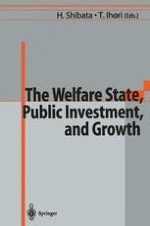1998 | OriginalPaper | Buchkapitel
Corruption, Public Investment, and Growth
verfasst von : Vito Tanzi, Hamid Davoodi
Erschienen in: The Welfare State, Public Investment, and Growth
Verlag: Springer Japan
Enthalten in: Professional Book Archive
Aktivieren Sie unsere intelligente Suche, um passende Fachinhalte oder Patente zu finden.
Wählen Sie Textabschnitte aus um mit Künstlicher Intelligenz passenden Patente zu finden. powered by
Markieren Sie Textabschnitte, um KI-gestützt weitere passende Inhalte zu finden. powered by
Up to the time when a huge corruption scandal, popularly labeled “tangentopoli” (bribe city), brought down the political establishment that had ruled Italy for several decades, that country had reported one of the largest shares of capital spending in GDP among the OECD countries. After the scandal broke out and several prominent individuals were sent to jail, or even committed suicide, capital spending fell sharply. The fall seems to have been caused by a reduction in the number of capital projects being undertaken and, perhaps more importantly, by a sharp fall in the costs of the projects still undertaken. Information released by Transparency International (TI)1 reports that, within the space of two or three years, in the city of Milan, the city where the scandal broke out in the first place, the cost of city rail links fell by 52 percent, the cost of one kilometer of subway fell by 57 percent, and the budget for the new airport terminal was reduced by 59 percent to reflect the lower construction costs. Although one must be aware of the logical fallacy of post hoc, ergo propter hoc, the connection between the two events is too strong to be attributed to a coincidence. In fact this paper takes the view that it could not have been a coincidence
